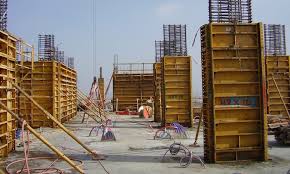In the construction industry, formwork plays a vital role in creating strong and precise concrete structures. Formwork is a temporary mold used to contain and shape liquid concrete until it sets and gains sufficient strength. It acts as the backbone or temporary support structure for the concrete during the pouring and curing process. Without proper formwork, the liquid concrete would not maintain its shape and would fail to create the desired structure.
One of the main benefits of formwork is the ability to achieve precise dimensional structures. Using carefully designed formwork, contractors can attain sizes and shapes that align with the design plan. Formwork helps control the dimensions and accuracy of the concrete structure being built, reducing the likelihood of errors and related losses.
Wall Formwork
Types of Formwork Used:
1. Wooden Formwork: Wooden formwork is the most commonly used in the construction industry due to its abundant availability and relatively low cost compared to other types. It utilizes strong and waterproof wood, such as plywood or hardwood, to provide the necessary strength to withstand the pressure of liquid concrete.
2. Metal Formwork: Metal formwork made of steel is a type that offers high strength and durability in construction. Steel has superior strength and can withstand high concrete pressure during pouring. This allows metal formwork to be used in projects that require high structural strength.
3. Plastic Formwork: Plastic formwork is made of strong and waterproof composite or polymer materials. It has several advantages that make it popular in certain construction projects. One key advantage is its lightweight and ease of assembly. Its lightweight nature makes it easy to transport, install, and move around the construction site. The simple assembly process allows contractors to quickly build the required formwork structures. However, plastic formwork may be less resistant to heavy loads compared to metal or concrete formwork. Therefore, plastic formwork is more suitable for small to medium-sized projects with relatively light loads. Projects involving thick concrete or heavy loads may require stronger and more durable types of formwork.
Overall, formwork is an indispensable tool in the construction of concrete structures. It ensures precision in shaping the concrete and plays a crucial role in achieving a successful and well-built construction project.
In concrete construction, formwork plays a crucial role in achieving strong, precise, and high-quality structures. By using the appropriate type of formwork, contractors can improve construction efficiency, reduce material wastage, and achieve superior results in terms of dimensions, strength, and concrete surface quality. It is essential to select, maintain, and use formwork properly to attain optimal outcomes in construction projects.
